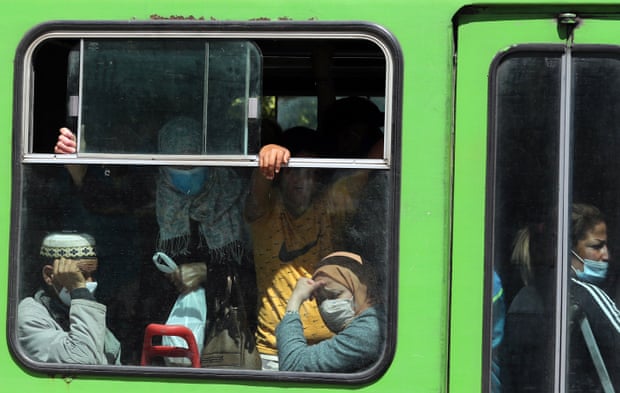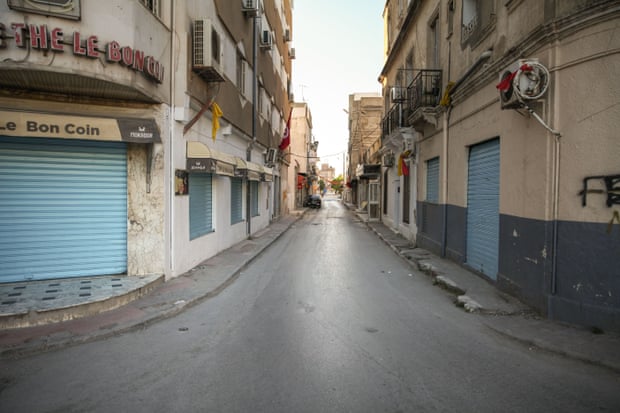Tunisia lockdown ends, despite Africa’s worst Covid death rate
Tunisia has ended its one-week lockdown, despite having the highest reported deaths per capita of any country in Africa.
Covid-19 cases in Tunisia were initially low last year, with a sweeping six-week lockdown involving the closure of borders and shutting down all but essential commercial activity appearing to halt the spread of the virus. However, since easing that original lockdown cases have increased, with daily reported infections and deaths now the highest in Africa, according to Our World in Data.
At least 11,899 of Tunisia’s 11.7 million people have died as a result of the virus, with 327,473 people infected. If its spread continues unchecked, the US Institute for Health Metrics and Evaluation website projects that the death toll will be close to 50,000 by September.
While the government has led in rhetoric, evidence of consistent action has been scant. Moreover, political instability and financial necessity are fostering a pandemic fatigue that is driving instances of the virus upwards across the country.
A big rally in support of the Palestinian cause went ahead in the capital, Tunis, last weekend, though with most people wearing masks. Rachid Ghannouchi, parliamentary speaker and founder of Ennahda, the self-styled Muslim Democrats, was pictured among a large crowd of masked mourners in the north-west town of Kef, despite lockdown travel restrictions.
Vaccines have been available in Tunisia since March. However, take-up is low amid widespread scepticism, even among healthcare workers, is high. So far, fewer than one in five Tunisians have registered for vaccinations on the government’s site, with accusations of queue-jumping rife.
Matters were not helped over Ramadan, when a hidden-camera prank TV show, featured an Angelina Jolie lookalike inviting local celebrities to front the country’s vaccine initiative, only for them to witness “recipients” of the vaccine fall sick and die. The World Health Organization complained about the programme, broadcast on a channel owned by the former presidential candidate Nabil Karoui.
The health sector, once a source of national pride, is at risk of buckling under the pandemic. Funding for health has been falling for years, economists have said, with the decline accelerating dramatically after cash was diverted to strengthen domestic security as Islamic State became more powerful.
Earlier this month healthcare workers staged a three-day strike over conditions and pay across the sector. Elsewhere, video footage obtained by the German broadcaster Deutsche Welle showed patients sleeping on the floors of a crowded waiting room, while one lay on top of a cupboard. Oxygen masks are at a premium as demand for oxygen constantly threatens to eclipse supply.
Dr Mohamed Ghedira, an anaesthetist and public health advocate who has worked in Covid wards across the country, was keen to play down the suggestion of chaos, pointing to good treatment outcomes. “Hospitals and private clinics are saturated, which means that patients can wait a long time before finding a bed available, especially for patients who are intubated and require intensive care,” he said.
The dramatic surge in Covid patients was placing intense strains upon Tunisia’s medical staff, whose numbers have been depleted through a steady exodus of professionals abroad, Ghedira said.
While Tunisia’s initial response to the pandemic may have won plaudits, it came at a cost that is shaping present policy. “Unemployment has exploded from 15% at the start of 2020 to 17.4% at the end of the year,” said Radhi Meddeb, an economist. He said the virus had had a devastating impact on a faltering economy that had shrunk by 8.8% during the pandemic, “leaving little if no room for manoeuvre for the government in terms of social support”.
Despite offers of tax relief and government loans, many Tunisians have found the economic burden of lockdown beyond them. Much of the workforce is made up of day labourers who are not eligible for government schemes.
The announcement of the lockdown itself, initially ruled out in early April, was met with protests. Many cafes and restaurants stayed open in defiance of the restrictions. Its ending, Meddeb said, had been driven as much by the street as by MPs.
Dr Zied Mhirsi, director of Global Health Strategies, which promotes public health worldwide, said: “This inability to implement public health measures is a reflection of the growing absence of trust in the government, which is in my opinion the most worrying sign.
“Roles and responsibilities are split within different ministry directorates and institutions, and that does not help for quick decision-making. It is also important to note that we have weak contact tracing, testing, monitoring and evaluation capabilities,” he said.
As in many countries, the economic pain of lockdown was seen as a greater risk than the virus, said Youssef Cherif, head of Columbia University’s Global Center in Tunis. “This low public concern has led to an increase in cases and to thousands of deaths in the last few months.
“Those who were directly hit, including my family, feel it, but those who were spared the grief and sorrow of this virus continue to live normally – until they are stricken.”



